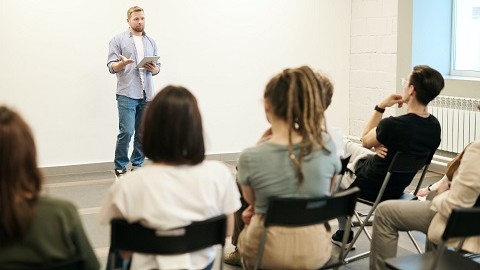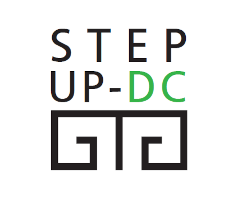Session 7C, Language in SE - NKUA Implementing EDC/HRE education through subject language teaching in secondary education
STEPUP-DC Project

Course DescriptionBasic Topics
- The development of language teaching paradigms and the aims of language teaching
- Subject language methods which implement EDC/HRE education
Duration
The duration of the session is 9 hours (3 reading + 3 learning + 3 working/practicing)
Objectives
The Objectives of this session are:
- Develop students’ confidence in leading initiatives and developing educational programs on EDC/HRE/IE.
- To establish a firm understanding of how the teaching of subject language can promote democratic competences, employing different teaching approaches
Learning outcomes
On completion of the session the students will be able to:
- identify which subject language teaching methods enable students to develop attitudes, values and skills associated with EDC/HRE
- develop different teaching approaches to language teaching so as to promote intercultural competences, critical understanding and critical literacies.
Outcomes and CDC
- Knowledge and critical understanding
- Knowledge and critical understanding of culture, cultures, religions
- 1812: Can reflect critically on how his/her judgments are influenced by his/her own cultural affiliations (intermediate/advanced)
- 2025: Can explain why all cultural groups are constantly evolving and changing (intermediate/advanced)
- 2026: Can explain why all cultural groups are internally variable, diverse and heterogeneous (intermediate/advanced)
- 132: Can explain why there are no cultural groups that have fixed inherent characteristics (advanced)
- Knowledge and critical understanding of politics, law and human rights
- 130: Can describe the diverse ways in which citizens can influence policy (advanced)
- Knowledge and critical understanding of history, media, economies, environment and sustainability
- 134: Can reflect critically on the fluid nature of history and how interpretations of the past vary over time and across cultures (advanced)
- 2051: Can reflect critically on the fluid nature of history and how interpretations of the past vary over time and across cultures (advanced)
- 2054: Can outline diverse narratives from different perspectives about the historical forces and factors that have shaped the contemporary world (advanced)
- 2055: Can reflect critically on processes of historical investigation (advanced)
- 2058: Can reflect critically on the connections between economic, social, political and environmental processes (advanced)
- Values
- Valuing cultural diversity
- 9: Expresses the view that the cultural diversity within a society should be positively valued and appreciated (intermediate)
- 205: Argues that one should try to learn from one another in order to deepen understanding of both one’s own and other people’s backgrounds (intermediate/advanced)
- Attitudes
- Respect
- 503: Expresses respect for different opinions, world views and ways of life unless they violate human rights (intermediate)
- Open to Cultural Otherness
- 25: Seeks and welcomes opportunities for encountering people with different values, customs and behaviours (intermediate)
- Tolerance of ambiguity
- 50: Engages well with other people who have a variety of different points of view (basic)
- Skills
- Autonomous Learning Skills
- 58: Shows ability to identify resources for learning (e.g. people, books, internet) (basic)
- Analytical and critical thinking skill
- 1102: Uses evidence to support his/her opinions (basic)
- 1111: Can analyse alternative points of view (basic/intermediate)
- 1108: Can distinguish between statements of fact and statements of opinion (basic/intermediate)
- 1116: Can construct a logical and defensible argument for or against a particular interpretation (basic/intermediate)
- 1117: Can evaluate arguments, claims and beliefs (basic/intermediate)
- 1141: Can analyse the motives, intentions and agendas of the people who produce propaganda, stereotypes, intolerance and hate speech in the mass media (e.g. newspapers, TV) (advanced)
- Skills of listening and observing
- 70: Listens carefully to differing opinions (basic)
- Linguistic, communicative and plurilingual skills
- 88: Can express his/her thoughts on a problem (basic)
- Co-operation skills
- 95: When working as a member of a group, does his/her share of the group’s work (basic)
- The development of language teaching paradigms and the aims of language teaching
- Subject language methods which implement EDC/HRE education
The duration of the session is 9 hours (3 reading + 3 learning + 3 working/practicing)
The Objectives of this session are:
- Develop students’ confidence in leading initiatives and developing educational programs on EDC/HRE/IE.
- To establish a firm understanding of how the teaching of subject language can promote democratic competences, employing different teaching approaches
On completion of the session the students will be able to:
- identify which subject language teaching methods enable students to develop attitudes, values and skills associated with EDC/HRE
- develop different teaching approaches to language teaching so as to promote intercultural competences, critical understanding and critical literacies.
- Knowledge and critical understanding
- Knowledge and critical understanding of culture, cultures, religions
- 1812: Can reflect critically on how his/her judgments are influenced by his/her own cultural affiliations (intermediate/advanced)
- 2025: Can explain why all cultural groups are constantly evolving and changing (intermediate/advanced)
- 2026: Can explain why all cultural groups are internally variable, diverse and heterogeneous (intermediate/advanced)
- 132: Can explain why there are no cultural groups that have fixed inherent characteristics (advanced)
- Knowledge and critical understanding of politics, law and human rights
- 130: Can describe the diverse ways in which citizens can influence policy (advanced)
- Knowledge and critical understanding of history, media, economies, environment and sustainability
- 134: Can reflect critically on the fluid nature of history and how interpretations of the past vary over time and across cultures (advanced)
- 2051: Can reflect critically on the fluid nature of history and how interpretations of the past vary over time and across cultures (advanced)
- 2054: Can outline diverse narratives from different perspectives about the historical forces and factors that have shaped the contemporary world (advanced)
- 2055: Can reflect critically on processes of historical investigation (advanced)
- 2058: Can reflect critically on the connections between economic, social, political and environmental processes (advanced)
- Knowledge and critical understanding of culture, cultures, religions
- Values
- Valuing cultural diversity
- 9: Expresses the view that the cultural diversity within a society should be positively valued and appreciated (intermediate)
- 205: Argues that one should try to learn from one another in order to deepen understanding of both one’s own and other people’s backgrounds (intermediate/advanced)
- Valuing cultural diversity
- Attitudes
- Respect
- 503: Expresses respect for different opinions, world views and ways of life unless they violate human rights (intermediate)
- Open to Cultural Otherness
- 25: Seeks and welcomes opportunities for encountering people with different values, customs and behaviours (intermediate)
- Tolerance of ambiguity
- 50: Engages well with other people who have a variety of different points of view (basic)
- Respect
- Skills
- Autonomous Learning Skills
- 58: Shows ability to identify resources for learning (e.g. people, books, internet) (basic)
- Analytical and critical thinking skill
- 1102: Uses evidence to support his/her opinions (basic)
- 1111: Can analyse alternative points of view (basic/intermediate)
- 1108: Can distinguish between statements of fact and statements of opinion (basic/intermediate)
- 1116: Can construct a logical and defensible argument for or against a particular interpretation (basic/intermediate)
- 1117: Can evaluate arguments, claims and beliefs (basic/intermediate)
- 1141: Can analyse the motives, intentions and agendas of the people who produce propaganda, stereotypes, intolerance and hate speech in the mass media (e.g. newspapers, TV) (advanced)
- Skills of listening and observing
- 70: Listens carefully to differing opinions (basic)
- Linguistic, communicative and plurilingual skills
- 88: Can express his/her thoughts on a problem (basic)
- Co-operation skills
- 95: When working as a member of a group, does his/her share of the group’s work (basic)
- Autonomous Learning Skills
A series of resources that the student teacher must study in this session and a series of additional resources for further study.
A full paper and additional e-lessons on the topics of the session and additional interactive presentation of the materials, for the student teachers to study all the materials in a row.
A series of authentic, up to date and relevant activities with their accompanying materials, which deliver the intended learning outcomes of the session and are carried out face to face or E-learning with groups of student teachers.
Several types of questions to evaluate how much the student teachers have learned throughout the session (reading material, learning material and workshop).
Calendar
Announcements
- - There are no announcements -
